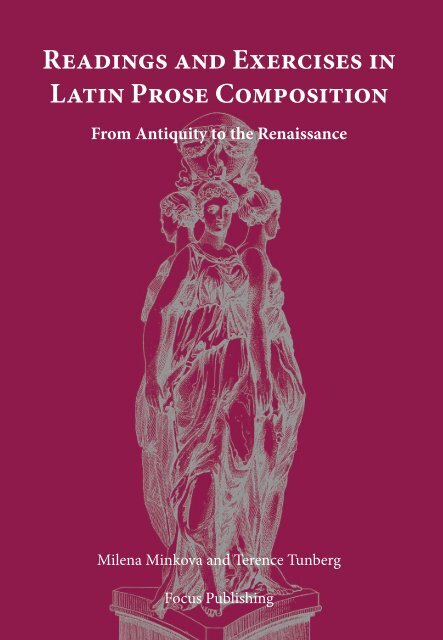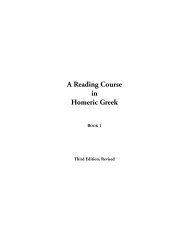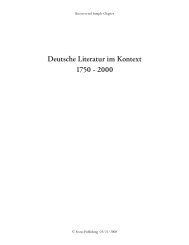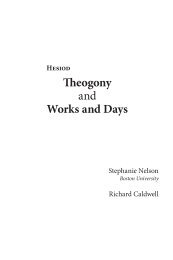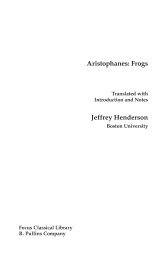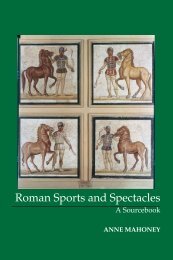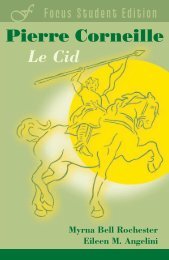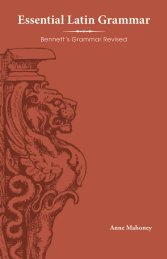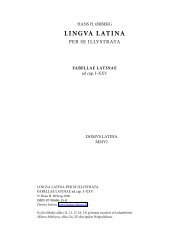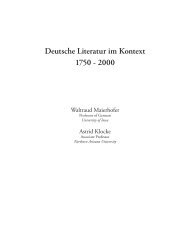Readings and Exercises in Latin Prose ... - Focus Publishing
Readings and Exercises in Latin Prose ... - Focus Publishing
Readings and Exercises in Latin Prose ... - Focus Publishing
You also want an ePaper? Increase the reach of your titles
YUMPU automatically turns print PDFs into web optimized ePapers that Google loves.
<strong>Read<strong>in</strong>gs</strong> <strong>and</strong> <strong>Exercises</strong> <strong>in</strong><br />
Lat<strong>in</strong> <strong>Prose</strong> Composition<br />
From Antiquity to the Renaissance<br />
Milena M<strong>in</strong>kova <strong>and</strong> Terence Tunberg<br />
<strong>Focus</strong> Publish<strong>in</strong>g
<strong>Read<strong>in</strong>gs</strong> <strong>and</strong> <strong>Exercises</strong> <strong>in</strong><br />
Lat<strong>in</strong> <strong>Prose</strong> Composition<br />
From Antiquity to the Renaissance<br />
Milena M<strong>in</strong>kova <strong>and</strong> Terence Tunberg<br />
Saepe Stilum Vertas<br />
<strong>Focus</strong> Publish<strong>in</strong>g<br />
Newburyport, Massachusetts<br />
2004
Copyright © 2004 Milena M<strong>in</strong>kova <strong>and</strong> Terence Tunberg<br />
ISBN 10: 1-58510-090-0<br />
ISBN 13: 978-1-58510-090-3<br />
This book is published by <strong>Focus</strong> Publish<strong>in</strong>g, R. Pull<strong>in</strong>s & Company, Inc., PO Box<br />
369, Newburyport MA 01950. All rights are reserved. No part of this publication<br />
may be reproduced, stored <strong>in</strong> a retrieval system, or transmitted <strong>in</strong> any form or by<br />
any means, electronic, mechanical, by photocopy<strong>in</strong>g, record<strong>in</strong>g, or by any other<br />
means, without the prior written permission of the publisher.<br />
10 9<br />
0108W
TABLE OF CONTENTS<br />
Preface .............................................................................................................................................. v<br />
1. The structure of the simple sentence. Active <strong>and</strong> passive voice; deponent verbs;<br />
impersonal verbs; copula <strong>and</strong> predicate nom<strong>in</strong>ative. Subject, direct object, <strong>in</strong>direct<br />
object, modifier. Agreement of the verb <strong>and</strong> the subject. Agreement of adjectives,<br />
pronouns <strong>and</strong> participles. Adverbs. ................................................................................... 1<br />
Read<strong>in</strong>g: Livy, Ab urbe condita, III, 26<br />
2. Word-order. General tendencies. The position of the subject, the direct object, the<br />
<strong>in</strong>direct object, other complements; adjectives; appositions; modifiers; adverbs;<br />
pronouns. Some special uses. ............................................................................................. 7<br />
<strong>Read<strong>in</strong>gs</strong>: Cicero, Tusculanae disputationes, III, 14; II, 58<br />
3. Expressions of place. .......................................................................................................... 13<br />
Read<strong>in</strong>g: Pl<strong>in</strong>y the Younger, Epistulae, VI, 16<br />
4. Expressions of time. ........................................................................................................... 21<br />
Read<strong>in</strong>g: Qu<strong>in</strong>tus Curtius Rufus, Historiae Alex<strong>and</strong>ri Magni, III, 1<br />
5. Use of tenses <strong>in</strong> the ma<strong>in</strong> clause (with occasional reference to their use <strong>in</strong> the<br />
subord<strong>in</strong>ate clause). ........................................................................................................... 27<br />
<strong>Read<strong>in</strong>gs</strong>: Liber Isaiae, 35; Sallust, De coniuratione Catil<strong>in</strong>ae, 31; 47<br />
6. Expressions of <strong>in</strong>strument, manner, accompaniment, price, degree of difference. .. 33<br />
Read<strong>in</strong>g: Erasmus of Rotterdam, Laus stultitiae, praefatio<br />
7. Expressions of quality, quantity, abundance, lack, cause, orig<strong>in</strong>, comparison,<br />
material, topic, aim, restriction, address. ........................................................................ 39<br />
Read<strong>in</strong>g: Caesar, De bello Gallico, VI, 13-28<br />
8. Statement of fact, negative statement of fact, statement of possibility, <strong>and</strong><br />
counterfactual statement. .................................................................................................. 49<br />
Read<strong>in</strong>g: Cicero, De amicitia, 19-23<br />
9. Question, doubt or deliberation, comm<strong>and</strong>, prohibition, exhortation, wish,<br />
concession, exclamation. ................................................................................................... 55<br />
Read<strong>in</strong>g: Plautus, Curculio, 599-678<br />
10. Impersonal verbs. ............................................................................................................... 63<br />
Read<strong>in</strong>g: Thomas More, Utopia, II, De commerciis mutuis; II, De peregr<strong>in</strong>atione<br />
Utopiensium<br />
11. Substantival <strong>in</strong>f<strong>in</strong>itive. Gerund. Gerundive. .................................................................. 69<br />
<strong>Read<strong>in</strong>gs</strong>: Elred, De amicitia, 1; E<strong>in</strong>hard, Vita Caroli Magni, 22; 23; 24<br />
12. Coord<strong>in</strong>ation <strong>in</strong> clauses <strong>and</strong> sentences: copulative, disjunctive, adversative,<br />
causal, consecutive connections. ...................................................................................... 77<br />
<strong>Read<strong>in</strong>gs</strong>: Petronius, Satiricon, 111-112; Passio Sanctarum Perpetuae et Felicitatis,<br />
18-21<br />
13. The use of tenses, moods <strong>and</strong> pronouns <strong>in</strong> subord<strong>in</strong>ate clauses. ................................ 85<br />
<strong>Read<strong>in</strong>gs</strong>: Cicero, De senectute, VII, 22-24; IX, 27-28; IX, 29; IX, 32.<br />
14. Substantival clauses: accusative <strong>and</strong> <strong>in</strong>f<strong>in</strong>itive, <strong>in</strong>direct questions, objective<br />
ut-clauses. ............................................................................................................................ 91<br />
<strong>Read<strong>in</strong>gs</strong>: Cicero, De oratore, II, 1-5; Cicero, In Catil<strong>in</strong>am, I, 1
15. Substantival clauses: explicative quod, explicative ut, verbs of fear<strong>in</strong>g, verbs of<br />
prevent<strong>in</strong>g <strong>and</strong> refus<strong>in</strong>g, non dubito qu<strong>in</strong>. ...................................................................... 99<br />
<strong>Read<strong>in</strong>gs</strong>: St. August<strong>in</strong>e, De civitate Dei, XXII, 8, 6; St. Ambrose, De excidio urbis<br />
Hierosolymitanae, V, 53; St. August<strong>in</strong>e, Enarrationes <strong>in</strong> Psalmos, <strong>in</strong> psalmum XCV<br />
enarratio, 14; Lactantius, Div<strong>in</strong>ae <strong>in</strong>stitutiones, III, 21; St. Jerome, Epistulae, XXI<br />
16. Adjectival clauses: relative clauses, attributive participle. .......................................... 107<br />
Read<strong>in</strong>g: Seneca, Epistulae, 56<br />
17. Adverbial clauses: temporal clauses. .............................................................................. 113<br />
Read<strong>in</strong>g: Tacitus, Annales, XV, 38-44<br />
18. Adverbial clauses: f<strong>in</strong>al (purpose) clauses <strong>and</strong> causal clauses. ................................... 119<br />
Read<strong>in</strong>g: Abelard, Historia calamitatum, Quomodo <strong>in</strong> amorem Heloisae lapsus<br />
vulnus <strong>in</strong>de tam mentis quam corporis traxerit<br />
19. Adverbial clauses: consecutive (result) clauses, concessive clauses. .......................... 127<br />
Read<strong>in</strong>g: Erasmus of Rotterdam, Epistula ad Nicolaum Varium Marvillanum<br />
20. Adverbial clauses: conditional sentences. ..................................................................... 135<br />
Read<strong>in</strong>g: Cicero, Tusculanae disputationes, V, 66-69<br />
21. Adverbial clauses: comparative, adversative, restrictive clauses. ............................... 141<br />
Read<strong>in</strong>g: Abelard, Historia calamitatum, Dehortatio supradictae puellae a<br />
nuptiis; de plaga illa corporis<br />
22. Oratio obliqua or <strong>in</strong>direct speech: ma<strong>in</strong> clauses <strong>and</strong> subord<strong>in</strong>ate clauses <strong>in</strong><br />
<strong>in</strong>direct speech; pronouns <strong>and</strong> adverbs <strong>in</strong> <strong>in</strong>direct speech. ....................................... 149<br />
Read<strong>in</strong>g: Cicero, In Verrem, II, 4; Caesar, De bello Gallico, VII, 20; Livy, Ab urbe<br />
condita, XXI, 30; Seneca, Epistulae, 53<br />
23. Conditional sentences <strong>in</strong> <strong>in</strong>direct speech. .................................................................... 157<br />
<strong>Read<strong>in</strong>gs</strong>: Cornelius Nepos, Vita Attici, 1-5<br />
24. Order of clauses. ............................................................................................................... 163<br />
Read<strong>in</strong>g: Cicero, Pro Archia poeta, 1-10<br />
25. Variation. ........................................................................................................................... 171<br />
Read<strong>in</strong>g: Erasmus of Rotterdam, De copia, “Tuae litterae me magnopere delectarunt”<br />
Appendix: The Conventions of Lat<strong>in</strong> Writ<strong>in</strong>g <strong>in</strong> the Post-Medieval World ...................... 181
PREFACE<br />
General approach:<br />
This book is an anthology of Lat<strong>in</strong> texts with exercises <strong>in</strong> Lat<strong>in</strong> <strong>Prose</strong> Composition. The<br />
exercises are not translations from English, but are closely jo<strong>in</strong>ed with the process of<br />
read<strong>in</strong>g <strong>and</strong> underst<strong>and</strong><strong>in</strong>g Lat<strong>in</strong>. We believe that learners who must th<strong>in</strong>k <strong>in</strong> Lat<strong>in</strong> while<br />
they compose will acquire the ability to compose Lat<strong>in</strong> more rapidly <strong>and</strong> effectively than<br />
those who are asked to convert thoughts communicated <strong>in</strong> another language <strong>in</strong>to Lat<strong>in</strong><br />
words <strong>and</strong> phrases. Translators of English (for example) <strong>in</strong>to Lat<strong>in</strong> are forced to th<strong>in</strong>k first<br />
<strong>in</strong> English <strong>and</strong> then search for Lat<strong>in</strong> equivalents. In this book the composition process is<br />
always from Lat<strong>in</strong> to Lat<strong>in</strong>.<br />
Those who compose <strong>in</strong> Lat<strong>in</strong>, especially with Lat<strong>in</strong> texts as a start<strong>in</strong>g po<strong>in</strong>t, will return to<br />
the read<strong>in</strong>g of any Lat<strong>in</strong> text with greater ease <strong>and</strong> more profound comprehension. Our<br />
book is perhaps especially appropriate for advanced undergraduates or graduate students,<br />
but there is no reason why it should not be useful for students of any age who are ready to<br />
embark on their first formal course <strong>in</strong> writ<strong>in</strong>g Lat<strong>in</strong> prose.<br />
How to use this book:<br />
In the beg<strong>in</strong>n<strong>in</strong>g of each chapter, we provide substantial excerpts from works of Lat<strong>in</strong><br />
literature. The read<strong>in</strong>gs are drawn from many genres <strong>and</strong> periods extend<strong>in</strong>g from the early<br />
Roman republic to the Renaissance, a time span of nearly 1,700 years. We believe that<br />
students who learn Lat<strong>in</strong> should realize from the start that they have access to any part of<br />
this immense tradition, <strong>and</strong> learn someth<strong>in</strong>g about its primary monuments <strong>and</strong> authors <strong>in</strong><br />
many periods. Lat<strong>in</strong> has the great advantage that it changed far, far less <strong>in</strong> such a vast space<br />
of time than any European vernacular <strong>in</strong> a much shorter period (compare, for example,<br />
the English of Chaucer <strong>and</strong> Dickens, whose lives were separated by about 500 years).<br />
Readers of this text, therefore, are always confronted with the boundless cultural richness<br />
of the Lat<strong>in</strong> tradition, <strong>and</strong> have a range of subjects for composition not restricted to the<br />
somewhat limited social <strong>and</strong> political world of Cicero <strong>and</strong> his contemporaries. But our<br />
anthology is not a historical manual on the evolution of Lat<strong>in</strong> prose style, nor is it ordered<br />
<strong>in</strong> a strictly chronological way. The grammatical norms upon which the exercises are<br />
based — our manual be<strong>in</strong>g an <strong>in</strong>troduction to prose writ<strong>in</strong>g — always reflect the classical<br />
usage of Caesar <strong>and</strong> Cicero, with a few other constructions typical of Livy, nor do we ask<br />
the reader to attempt to imitate other styles. We provide no grammatical commentary<br />
on the read<strong>in</strong>gs. Students should approach the read<strong>in</strong>gs <strong>in</strong> the same way as they would<br />
undertake the read<strong>in</strong>g of a Lat<strong>in</strong> author <strong>in</strong> a st<strong>and</strong>ard modern edition, such as those <strong>in</strong><br />
the Teubner or Oxford series, <strong>and</strong> be prepared to have recourse to a good lexicon where<br />
necessary. Notes on the vocabulary of the read<strong>in</strong>gs are very sparse, <strong>and</strong> restricted to those<br />
words which do not appear <strong>in</strong> the large dictionary by Lewis <strong>and</strong> Short.<br />
From these read<strong>in</strong>gs comes the subject matter for the exercises <strong>in</strong> each chapter. The<br />
exercises consist of Lat<strong>in</strong> words, phrases, sentences, <strong>and</strong> paragraphs which must be<br />
re-worked <strong>in</strong>to other forms. The reader must complete <strong>in</strong>complete thoughts, correct<br />
<strong>in</strong>correct phrases, answer questions, the responses to which require certa<strong>in</strong> constructions,<br />
change the po<strong>in</strong>t-of-view of entire passages, etc. Just as the subject matter of each exercise<br />
is nearly always related to the read<strong>in</strong>g passages <strong>in</strong> the chapter, so also each exercise is
concerned <strong>in</strong> some way with the constructions <strong>and</strong> grammatical pr<strong>in</strong>ciples featured <strong>in</strong><br />
the same chapter. Our strategy is to provide a very wide variety of exercises, some of<br />
which are quite closely adapted to the type of material treated <strong>in</strong> each chapter. Hence the<br />
typology of exercises varies somewhat from chapter to chapter. The reader will get plenty<br />
of practice, if s/he does all the exercises.<br />
At the end of each chapter there is a brief series of exercises <strong>in</strong> free composition.<br />
These exercises are quite unconnected with the read<strong>in</strong>gs <strong>in</strong> each chapter, nor do they<br />
necessarily relate to the grammatical pr<strong>in</strong>ciples highlighted <strong>in</strong> the chapter. The purpose<br />
of these exercises is to offer the learner a brief change of pace, an opportunity for greater<br />
freedom of expression, a chance to deploy not only imag<strong>in</strong>ation, but whatever resources<br />
of language s/he may have acquired up to that po<strong>in</strong>t. Each exercise <strong>in</strong> free composition<br />
consists of an assignment to write one or two short paragraphs. Each paragraph is to be<br />
constructed around either a series of Lat<strong>in</strong> phrases perta<strong>in</strong><strong>in</strong>g to typical thought processes<br />
<strong>and</strong> actions, or a Lat<strong>in</strong> proverb. In each case we provide the beg<strong>in</strong>n<strong>in</strong>g of the paragraph,<br />
consist<strong>in</strong>g of a sentence or two. The learner must complete the paragraph. The phrases<br />
<strong>and</strong> proverbs, which must be <strong>in</strong>corporated <strong>in</strong>to each paragraph, have been adapted<br />
from ‘De copia’ <strong>and</strong> ‘Adagia’, collections of classical Lat<strong>in</strong> say<strong>in</strong>gs by the great humanist<br />
Desiderius Erasmus of Rotterdam.<br />
We wanted the whole of each chapter to be devoted to copious read<strong>in</strong>gs <strong>and</strong> exercises<br />
based upon them. Because abstract grammatical rules have been well treated <strong>in</strong> other<br />
books, we saw no need to repeat them here. Therefore, <strong>in</strong> the beg<strong>in</strong>n<strong>in</strong>g of each chapter,<br />
readers of our book are referred to the relevant sections of several descriptive grammatical<br />
manuals, <strong>in</strong> which the necessary pr<strong>in</strong>ciples for each of our chapters are treated thoroughly.<br />
Here are the descriptive texts that may be used together with this book:<br />
Allen <strong>and</strong> Greenough’s New Lat<strong>in</strong> Grammar, Newburyport MA, 2001 (based on 1903<br />
revision of 1888 edition) (a very complete <strong>and</strong> useful reference work).<br />
‘Bradley’s Arnold’ Lat<strong>in</strong> <strong>Prose</strong> Composition, London, 2001 (facsimile of 1984 edition)<br />
(grammatical pr<strong>in</strong>ciples are lucidly expla<strong>in</strong>ed <strong>in</strong> many of the chapters).<br />
M. M<strong>in</strong>kova, Introduction to Lat<strong>in</strong> <strong>Prose</strong> Composition, London 2001(the theoretical<br />
pr<strong>in</strong>ciples of Lat<strong>in</strong> expression are presented here <strong>in</strong> a progression <strong>and</strong> order similar to the<br />
one used <strong>in</strong> this book of exercises).<br />
Milena M<strong>in</strong>kova wrote chapters I, III, IV, IX, XII, XIV, XV, XVII, XVIII, XXI, XXIV, XXV,<br />
<strong>and</strong> Terence Tunberg chapters II, V, VI, VIII, X, XI, XIII, XVI, XIX, XX, XXIII, together<br />
with the appendix. Both authors together composed chapters VII <strong>and</strong> XXII. But each<br />
always benefited greatly from the other’s support, ideas, <strong>and</strong> advice <strong>in</strong> the composition of<br />
every part of the book.<br />
We would like to thank all the students who have used this book with us <strong>and</strong> have<br />
contributed to a more emended version of the text by offer<strong>in</strong>g their remarks <strong>and</strong><br />
suggestions. Special thanks are due to Joseph Tipton, who carefully proofread the whole<br />
work.<br />
M.M. <strong>and</strong> T.T.<br />
Lex<strong>in</strong>gton, KY 2003<br />
i
1<br />
The structure of the simple sentence<br />
Acti e <strong>and</strong> passi e oice; deponent erbs; impersonal<br />
erbs; copula <strong>and</strong> predicate nom<strong>in</strong>ati<br />
e. Subject, direct object, <strong>in</strong>direct object,<br />
modifier. Agreement of the erb <strong>and</strong> the subject.<br />
Agreement of adjecti es, pronouns <strong>and</strong><br />
participles. Ad erbs.<br />
Read<strong>in</strong>g: Livy, Ab urbe condita, III, 26.<br />
(Allen <strong>and</strong> Greenough, 158-191; Bradley’s<br />
Arnold, 1-14, 36-37, 49-53, 55-57)<br />
1.1 Carefully read the follow<strong>in</strong>g text by Livy.<br />
Livy (50 B.C.-17 A.D.) is the greatest Roman historian of the Augustan period. His<br />
history entitled Ab Urbe condita is a monumental epic <strong>in</strong> prose s<strong>in</strong>g<strong>in</strong>g the glory of<br />
Rome. Only parts of the 142 books have come down to us (books 1-10, cover<strong>in</strong>g up<br />
to 293 B.C.; books 21-45, cover<strong>in</strong>g from 219 B.C. to 167 B.C.; a fragment of book 91,<br />
about 80 B.C.). In the follow<strong>in</strong>g passage, Livy offers a sample of Roman virtue <strong>in</strong> the<br />
persona of C<strong>in</strong>c<strong>in</strong>natus.<br />
Li . III, 26<br />
…… Nautium consulem arcessunt. In quo cum parum praesidii<br />
ideretur dictatoremque dici placeret qui rem perculsam<br />
restitueret, L. Qu<strong>in</strong>ctius C<strong>in</strong>c<strong>in</strong>natus consensu omnium<br />
dicitur. Operae pretium est audire qui omnia prae di itiis<br />
humana spernunt neque honori magno locum neque irtuti<br />
putant esse, nisi ubi effuse affluant opes. Spes unica imperii<br />
populi Romani, L. Qu<strong>in</strong>ctius trans Tiberim, contra eum ipsum<br />
locum ubi nunc na alia sunt, quattuor iugerum colebat agrum,<br />
1
2 • Chapter One<br />
quae prata Qu<strong>in</strong>ctia ocantur. Ibi ab legatis—seu fossam<br />
fodiens palae <strong>in</strong>nixus, seu cum araret, operi certe, id quod<br />
constat, agresti <strong>in</strong>tentus—salute data <strong>in</strong> icem redditaque<br />
rogatus ut, quod bene erteret ipsi reique publicae, togatus<br />
m<strong>and</strong>ata senatus audiret, admiratus rogitansque ‘sat<strong>in</strong><br />
salve?’ togam propere e tugurio proferre uxorem Raciliam<br />
iubet. Qua simul absterso pul ere ac sudore elatus<br />
processit, dictatorem eum legati gratulantes consalutant,<br />
<strong>in</strong> urbem ocant; qui terror sit <strong>in</strong> exercitu exponunt. Na is<br />
Qu<strong>in</strong>ctio publice parata fuit, trans ectumque tres ob iam<br />
egressi filii excipiunt, <strong>in</strong>de alii prop<strong>in</strong>qui atque amici, tum<br />
patrum maior pars. Ea frequentia stipatus antecedentibus<br />
lictoribus deductus est domum. Et plebis concursus <strong>in</strong>gens<br />
fuit; sed ea nequaquam tam laeta Qu<strong>in</strong>ctium idit, et<br />
imperium nimium et irum ipso imperio ehementiorem rata.<br />
Et illa quidem nocte nihil praeterquam igilatum est <strong>in</strong> urbe.<br />
1.2 Summarize the story that you just read with<strong>in</strong> fifteen simple sentences.<br />
You will f<strong>in</strong>d the necessary material for the construction of these sentences <strong>in</strong> the<br />
columns below. The verbs needed for each sentence are <strong>in</strong> the first column; the<br />
subjects are <strong>in</strong> the second; the direct objects are <strong>in</strong> the third; the <strong>in</strong>direct objects are<br />
<strong>in</strong> the fourth; the modifiers are <strong>in</strong> the fifth column. Every row conta<strong>in</strong>s the material<br />
for one sentence. All the verbs should be put <strong>in</strong> the present tense. Where necessary,<br />
a double accusative is to be used.<br />
Example:<br />
verbs subjects<br />
direct<br />
objects<br />
<strong>in</strong>direct<br />
objects modifiers<br />
annuntio legati decreta C<strong>in</strong>c<strong>in</strong>natus Romani<br />
Legati Romanorum decreta C<strong>in</strong>c<strong>in</strong>nato annuntiant.<br />
verbs subjects<br />
direct<br />
objects<br />
a. nom<strong>in</strong>o Romani C<strong>in</strong>c<strong>in</strong>natus<br />
dictator<br />
<strong>in</strong>direct<br />
objects modifiers<br />
b. colo C<strong>in</strong>c<strong>in</strong>natus ager quattuor iugera<br />
c. aro solum<br />
d. fodio fossa<br />
e. saluto legati C<strong>in</strong>c<strong>in</strong>natus<br />
f. exopto legati omnia bona C<strong>in</strong>c<strong>in</strong>natus
verbs subjects<br />
direct<br />
objects<br />
g. resaluto C<strong>in</strong>c<strong>in</strong>natus legati<br />
Chapter One •<br />
<strong>in</strong>direct<br />
objects modifiers<br />
h. annuntio legati decreta C<strong>in</strong>c<strong>in</strong>natus Romani<br />
i. affero uxor toga maritus C<strong>in</strong>c<strong>in</strong>natus<br />
j. abstergeo C<strong>in</strong>c<strong>in</strong>natus pulvis<br />
k. velo sudor C<strong>in</strong>c<strong>in</strong>natus<br />
l. abeo C<strong>in</strong>c<strong>in</strong>natus<br />
dictator<br />
m. antecedo lictores<br />
n. exspecto filii<br />
prop<strong>in</strong>qui<br />
amici<br />
patres<br />
o. non gaudeo plebs<br />
dictator<br />
1.3 Now, when you have your fifteen sentences, change the voice from active<br />
<strong>in</strong>to passive. Other elements of the sentences will also have to be changed<br />
accord<strong>in</strong>gly. Remember that <strong>in</strong>transitive verbs do not have a passive voice.<br />
Therefore, sentences <strong>in</strong> which such forms are found will not be changed.<br />
1.4 In four of the sentences written <strong>in</strong> exercise 1.2., substitute a deponent verb <strong>in</strong><br />
the place of the non-deponent one. The four deponent verbs to be used are<br />
praestolor, proficiscor, om<strong>in</strong>or, laetor.<br />
1.5 In the follow<strong>in</strong>g list there are adjectives, pronouns <strong>and</strong> participles. This list<br />
follows the order of the fifteen sentences written <strong>in</strong> exercise 1.2. Add each<br />
adjective, pronoun, or participle to an appropriate noun <strong>in</strong> the correspond<strong>in</strong>g<br />
sentence.<br />
a. probus f. idem k. emissus<br />
b. ille g. salutans l. novus<br />
c. pulvereus h. audiens m. appositus<br />
d. latus i. praetextus n. quidam<br />
e. missus j. collectus o. creber
• Chapter One<br />
1.6 In the follow<strong>in</strong>g list are fifteen adverbs that are to be added to the fifteen<br />
sentences written <strong>in</strong> exercise 1.2. The order of this list does not correspond<br />
to the order of sentences <strong>in</strong> exercise 1.2. You should add each adverb to the<br />
sentence <strong>in</strong> which it would fit best. Some adverbs could be added to more than<br />
one sentence.<br />
attente<br />
avide<br />
comiter<br />
contra<br />
e more<br />
graviter<br />
laboriose<br />
officiose<br />
operose<br />
propere<br />
sedulo<br />
sollemniter<br />
statim<br />
ubique<br />
unanimiter<br />
1.7 From the elements provided below, write sentences <strong>in</strong> which there is a copula<br />
<strong>and</strong> a predicate nom<strong>in</strong>ative.<br />
Example:<br />
caecus fortuna esse<br />
Fortuna est caeca.<br />
a. spes populus Romanus C<strong>in</strong>c<strong>in</strong>natus unus esse<br />
b. imperium C<strong>in</strong>c<strong>in</strong>natus nimium videri<br />
c. C<strong>in</strong>c<strong>in</strong>natus dictator vehementissimus exstare<br />
1.8 Change the follow<strong>in</strong>g sentences so that the ma<strong>in</strong> verb becomes impersonal.<br />
Other changes will also be necessary to ensure that the sentences make sense.<br />
Example:<br />
Hom<strong>in</strong>es undique C<strong>in</strong>c<strong>in</strong>nato gratul<strong>and</strong>i causa veniunt.<br />
Undique C<strong>in</strong>c<strong>in</strong>nato gratul<strong>and</strong>i causa venitur.<br />
a. Viri mulieresque huc atque illuc tumultuantes eunt.<br />
b. Plebs non gaudet.<br />
c. Omnes per totam noctem vigilaverunt.<br />
d. Nullis militibus nocuit C<strong>in</strong>c<strong>in</strong>natus.<br />
e. Contra Gallos ferociter pugnaverunt.<br />
1.9 Change the <strong>in</strong>f<strong>in</strong>itives that are <strong>in</strong> parentheses <strong>in</strong>to participles. Choose the<br />
appropriate tense, voice, case, gender <strong>and</strong> number, accord<strong>in</strong>g to the mean<strong>in</strong>g of<br />
the sentence.<br />
(hortari) ______________ uxorem ut togam proferret Romamque (proficisci)<br />
______________ amicis vale dixit C<strong>in</strong>c<strong>in</strong>natus. Qui togatus Romam t<strong>and</strong>em<br />
advenit, m<strong>and</strong>ata senatus (audire) ______________ A senatoribus (arcessere)<br />
____________ C<strong>in</strong>c<strong>in</strong>natus dictaturam accepit. Re publica (tueri)_____________<br />
C<strong>in</strong>c<strong>in</strong>natus gloriam adeptus est sempiternam.
<strong>Read<strong>in</strong>gs</strong> <strong>and</strong> <strong>Exercises</strong> <strong>in</strong> Lat<strong>in</strong> <strong>Prose</strong> Composition provides a refresh<strong>in</strong>g approach for the<br />
st<strong>and</strong>ard Lat<strong>in</strong> composition course off ered at the college level. In <strong>Read<strong>in</strong>gs</strong> <strong>and</strong> <strong>Exercises</strong><br />
the student is encouraged to th<strong>in</strong>k <strong>in</strong> Lat<strong>in</strong> through the process of read<strong>in</strong>g unedited Lat<strong>in</strong><br />
selections <strong>and</strong> then compos<strong>in</strong>g <strong>in</strong> Lat<strong>in</strong>, as opposed to the process of translat<strong>in</strong>g back <strong>and</strong><br />
forth <strong>in</strong>to English. Th e book off ers a number of highly structured composition exercises<br />
that <strong>in</strong>troduce students to a deeper underst<strong>and</strong><strong>in</strong>g of Lat<strong>in</strong> grammar <strong>and</strong> prose as well as<br />
to greater facility <strong>in</strong> read<strong>in</strong>g <strong>and</strong> underst<strong>and</strong><strong>in</strong>g it.<br />
<strong>Focus</strong> Publish<strong>in</strong>g<br />
R. Pull<strong>in</strong>s Company<br />
Newburyport, MA 01950


